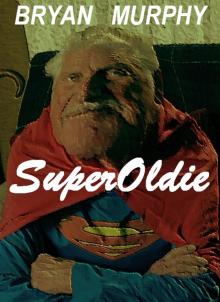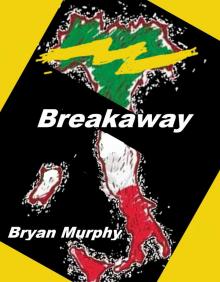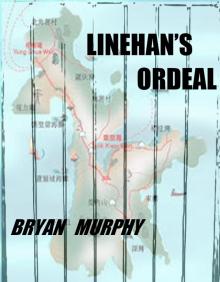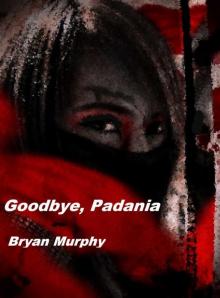- Home
- Bryan Murphy
Goodbye, Padania Page 2
Goodbye, Padania Read online
Page 2
Veronica looked at her tongue-tied friend with pity. A crush on a mature man would set back her development; the boys would sense she was weird and keep their distance. Not necessarily a bad thing: she might even keep –
“My God, you haven’t?”
Shock ripped the mask of sophistication from Veronica’s baby face.
“Oh no! Daria, why?”
Why deny it?
“The love of the Lord .. love … body and soul.”
“Yeah, right, your body and every other little virgin’s that he can con into his cloister. You think you’re the only one?”
Veronica saw from Daria’s face that she did. She strove for a way to help her. Best make her see the truth now, before it was too late, before she got knocked up. She was old enough, damn it.
“You want proof, I’ll give it to you. Cazzo!”
Veronica’s fingers jerked away the cigarette which had burnt down on to them. She saw Daria was crying.
“Jesus wept, this is real pain,” she said, flapping her scorched fingers. “I’m off home. Miss Father-fucker, learn to keep your legs crossed, advice from one who knows.”
As she stomped off towards the unfailing balm of her mother’s over-concern, most of the pain Veronica felt was for Daria.
The mobile phone that Francesco had lent Daria vibrated in her purse. This time the messenger was not him, though the message was. A sick feeling spread throughout Daria as she scrolled through the photos Veronica had sent her. She did not recognise the girl – someone perhaps younger, and certainly plainer, than Daria. The penis looked like Francesco’s, but perhaps they all did. The out-of-focus body resembled his, though it could just as easily be someone else’s. In fact, it could not be Father Francesco, because he’d sworn he was hers alone! Her fingers hurt as she jabbed the buttons: “Nice try, Veronica”.
She saw neither her friend nor her lover for nearly a week. Then, on Saturday afternoon, when Daria was busy with her maths homework, her phone vibrated and Veronica was back in touch.
“I’m downstairs waiting for you. Let’s go!”
“Where?”
“You’ll see, kid. This time you’ll really see.”
Daria closed the phone and left it on her bed. She went out through the kitchen without saying anything to her parents in the living room. Down below, Veronica was revving her scooter. They did not exchange a word as Daria clambered on the back of it. Veronica felt Daria’s strong fingernails digging into her shoulders as they accelerated away.
Veronica drove through the dusty town, then out along the road that hugged the coastline and narrowed as it rose from beachside to cliff. She pulled into a small car park behind the “Trattoria Belvedere”.
“From here, we go on foot. Quietly. Got it?”
Daria nodded and followed her friend. She knew where Veronica was taking them. Some two hundred metres beyond the restaurant stood a long-abandoned holiday cottage, a relic of the days when their bustling little town had been a picturesque fishing village on the tourist map. As they approached, Daria prayed that it would be empty. Even though Veronica’s voice came in a whisper, it startled her.
“You wouldn’t believe the things I’ve seen here.”
Daria stared at her levelly.
“I’ve never believed your stories. Any of them.”
It seemed a reasonable lie. Veronica’s face hardened.
“Well, this time, seeing had better be believing. Now shut up.”
Veronica halted them at the threshold, where a front door had once been. She gestured Daria to listen. Daria heard nothing but the pounding of her blood. Then a kind of squealing, and a heavier, more regular sound. Veronica propelled her through the entrance. Daria felt her feet dragging her towards the end of her short happy youth.
As she came into the second room, two faces, one above the other, rose to stare at her, each displaying a different shade of horror. The lower face belonged to the girl in the photos. It screamed when it saw the kitchen knife twitching in Daria’s right hand. The face above it, partly obscured by the girl’s hair, was Francesco’s. Emotion drained from it as he pushed down on the girl’s back to prise his body free of hers and raise it from the mattress. Daria’s eyes fixed on his glistening penis as he strode towards her. Her hand clenched on the knife, but a glancing blow from his elbow sent it flying from her hand – the first and last time someone would disarm her so easily – as he passed. He was out of the front door; Veronica had disappeared. Then the back of his naked body, receding, appeared in the window in front of Daria. The figure broke into a run, stumbled, regained its footing and its poise, went on as though it had a spring in its step. Daria’s ears were battered by Father Francesco’s scream as he leapt into the void beyond the cliff-edge. It sounded for all the world like a scream of defiance.
Sicily, 2022.
Daria realised she had been repeatedly hitting the man’s head against the flagstones. He was dead. But this was a knife job. She drew the stiletto from its scabbard inside her boot and plunged it deep into the priest’s back. She would leave it there for the Church. They had paid for it, after all. Calmly, Daria pulled off her mask and her outer coverall. She primed them to disintegrate and threw them into a corner as she slipped back into the shadows, circumnavigated the cloister and stepped through the main door into the empty street, an early-rising tourist shielding her eyes against the bright Southern light and looking forward to the sights the new day would bring. Somewhere close by, a bell summoned the faithful.
***************
Chapter 3
Breakthrough
Giving up was hard. Every time Daria thought she had got it cracked, circumstances conspired against her.
Shantha found it hard to assess how her guest lecture at Rome University’s Philosophy Department had gone down. Her husband had done his usual competent job as her interpreter, for his love of opera and wine had sparked a lifelong study of Italian. Yet although the faculty had been welcoming beforehand and complimentary afterwards, the questions they and their students had put suggested they either had not understood her arguments against post-modernism or else felt such rigour was politically incorrect.
That all became irrelevant when the call from Colombo told them the civil war had robbed them of Bala, the last survivor among their children. Shantha’s heart stopped. When it began, with effort, to beat again, the paralysis had moved up to stop her tongue.
She did regain the power of speech, but the words flew fitfully from her brain and tripped awkwardly from her lips. Aravinda knew he could never take her back to Sri Lanka. Home had become hell, and cold exile was better than burning. The carefree life he had lived was over. From now on, he would care for Shantha and keep their bodies and souls together somehow.
There was no work for them at Rome University: an occasional visiting lecture, yes, but they were foreign, much too foreign for a teaching post. Nevertheless, a Roman colleague found a place for them to stay, in a country house up in the north of Italy, not far from the city of Turin. There, they earned their keep by doing odd jobs, a little domestic work, which gradually expanded to all the jobs, all the domestic work.
The owner, an elderly lady as alone in the world as they were, was grateful, looked after them when much of the north broke away from the rest of Italy to invent the racist nation of “Padania”. She paid the young bloods in the village to keep the “ethnic cleansing” squads off their tracks, saw to it that there was enough for them all to eat, even when the new pariah state’s economic collapse had made the pursuit of food far from trivial, and helped to heal their psychological wounds with the balm of her affection. Now she, too, had died.
She had bequeathed them her money, but they no longer had her protection. That money would race against time to get them out of Padania: to Italy, to England, to India, to any of the myriad lands where people were starting the year 2034 in the pursuit of wealth and happiness rather than of food to scavenge or a neighbour to kill.
Lik
e many of his entrepreneurial kind, Walter had welcomed Padania’s breakaway from Italy. At a stroke, as he saw things, it had broken free of the overweening, incompetent government in Rome and the corrupt, wilfully backward south of Italy, which vacuumed up most of the taxes Rome leeched from the efficient, hard-working north. It had been fun cleaning up the new country, actively discouraging further immigration, and gradually getting rid of undesirables who failed to take the hint: Africans, Asians, east Europeans, southern Italians.
The Padanians had not expected much sympathy from the so-called international community, but the speed and strength of its response to the new country’s racial policies came as a shock. Within two years, Padania was expelled from the European Union, the Council of Europe, NATO, the United Nations and every one of its agencies. It was left to its own devices, proudly alone. Factories which had not closed for lack of manpower now started to shut for lack of orders and lack of capital. Tourism dried up. Most new technology passed Padania by.
Walter had managed to keep his factories going, first by taking on youngsters who would otherwise have risked encountering bad ideas in books, and then by diversifying into disposal deals with tiger economies like Pershi’a, Korea and East Turkestan, whose toxic waste could be said to keep Padania afloat. Yet now, local bigmouths were protesting against “child labour” and “environmental poisoning”.
Well, he might ride that out and ignore his fellow citizens’ deepening poverty, but there was worse. The pariah state, unable to bite its tormentors, was now intent on tearing off its own tail: as each successive contaminating influence was eliminated, and the body politic remained sick, another scapegoat had to be found. Walter was a true son of the soil, born and bred in the Padanian heartland on the banks of the river Po, but his wife’s darkly Mediterranean complexion showed that she, and their children too, had “bad blood”, and soon the racial laws would be turned against them. Walter deemed it better for the family to get out first.
The shifty-eyed snakehead to whom he had handed over proceeds from the sale of one of his factories had merely accompanied them on the train journey from Vercelli to Ceva, then driven them in a battered FPAT van out of the town up into the hills, where he had handed them on to this woman and simply disappeared. Walter was not prejudiced, certainly not against women. This one looked as though she knew what she was about, and although she was suspiciously swarthy, her colouring served to remind him of his wife when she had been younger, in more innocent times.
In the aftermath of independence, the Padanian government denied the existence of death squads. Nevertheless, many of those people who not only clung to the old ideas of Italian identity, free thought and natural rights, but also gave voice to them, disappeared. Sometimes their bodies reappeared, lifeless and mutilated. The terror was calmed and dissipated by the Teleset media empire, with its blanket coverage of good news like the environmental self-cleaning that followed the collapse of industry, the falling number of road accidents, and the monthly Miss Padania beauty contests.
Dissent lay dormant, but two decades of economic and social meltdown were beginning to spark a reaction from the raw nerves of youngsters who had experienced nothing else. Such a one was Davide.
No matter what the television told him, Davide could not shake off the belief that the young men and women who had taken to the hills of Piedmont to fight the fascists way back in the last century had done the right thing. People like his grandfather, whom he had known so briefly. The family spirit of resistance was re-lit in him, and he had eagerly joined a clandestine group of self-proclaimed partisans. The Greenshirts had made short shrift of them: Valentina and Michele’s headless bodies had been dumped at night on their parents’ doorstep; Simone, Luca and Chiara were in jail, being softened for a show trial. The other five, including Davide, had disappeared, but Davide’s disappearance, at least, was of his own free will. He intended to get out of Padania, to organise resistance and opposition from exile. The first step, escape, was the most hazardous.
Getting out of Padania fast meant relying on the people-smuggling networks that had sprung up when emigration as well as immigration had been outlawed, a ban enforced by electrified walls and laser-happy frontier militias. Davide was not happy to bring the nascent Resistance into contact with organised crime, but it was his only way out. He had insisted on paying the full fee, in advance, so that his escape could not be gifted as a “favour”, to be repaid later in a heavier currency. Now something odd was going on. The role of guide had been taken over by a short, dark, hard-faced woman with an air of being totally in control of herself and totally dangerous to others.
Davide was equally disturbed by another woman his flight had forced him into contact with. Rita was even younger than him: a lithe blonde with a well-groomed, pampered look that had become rare in the pariah state. She had kept her distance on the first day, though her eyes often followed him. She appeared in his tent that night as he lay grasping at sleep, and made love to him with a blind hunger that he knew he was not the inspiration for. Afterwards, she had told him that she was escaping the draft, looking for a country that would not seek to impose a uniform on her body or her mind.
When Daria walked out of the barn and saw the two men who had called her name, she realised she would not be able to resist the temptation. It was too easy, too elemental, like lighting a cigarette, though she had not done that for years.
“I am Daria Rigoletti,” she said as she walked up the incline to where they stood nursing sawn-off shotguns.
She stopped between them, raising her arms and holding them out at her sides to suggest she was unarmed. At the same time, she flicked her fingers to dislodge the gas pellets from her nails. The tiny flares exploded instantly, enveloping them all in acrid smoke. Daria twisted and dived to her left, hit the ground rolling. She heard bursts of gunfire, then her moving body took one of the men’s legs from under him. Her knife was in her hand, then her hand was drenched in blood as the knife ripped through the man’s stomach up into his heart.
That one was silent, dead. The other one was wounded, moaning, dying. Daria located him by his moans. His shotgun had fallen beyond his reach. Daria could see he was bleeding to death. Quickly, clinically, she put him out of his misery. Then her old fury overtook her, mingled with contempt for incompetent Mafia hitmen, and drove her knife repeatedly in and out of the lifeless body.
Roberto squinted from his hiding place inside the barn as Daria walked out in answer to their call. He had only been with her a day, as they trudged into the Piedmontese hills. Daria was his, and his family’s, ticket out of Padania, where life was turning grimmer by the day, into Italy, where economic development had never stopped and the streets were paved. Had something gone wrong? The two men who had called Daria out looked Mediterranean, like Daria herself, but they eyed her coldly as she walked toward them, and they held weapons that could no longer be purchased locally. He saw Daria standing at the brow of the small hill, her arms outstretched, flanked by the two outlaws. Then she, all three, disappeared in clouds of smoke, and he heard gunfire, screams, moaning; then silence. He guessed what that meant: the end of their hopes – future poverty and present danger the least of the group’s worries. He staggered out of the barn, bent over and retched long and loud. When he looked up, a figure was descending the hill in front of the barn. She moved calmly, though her hands and most of her cassock were covered in blood. “Let’s move on,” she said.
Rita appointed herself the group’s rearguard over the next two days, as they followed the river then climbed toward the high hill pass that marked the frontier between Padania and Italy. The dark, hard-faced woman was not the only one who knew how to kill, and Rita was determined to protect herself not only against any members of the gang to whom the snakehead had betrayed them, who might still be tracking them, but also against anyone in the group unwise enough to think of deserting and giving their position away through stupidity or avarice.
Rita reckoned the Sri Lankan
couple were hardy enough to stay the course. What was more, they had nowhere to go back to. The boy she had given herself to, or rather forced herself upon, the previous night was a youth with a mission, with the force of his companions’ deaths behind him. It was the two Padanian families she would have to keep an eye on: they were opportunists, and an opportunity to become official heroes by betraying the fugitives might prove hard to resist. And herself? Better death than “gang green”, her term for the Padanian Government’s ideology enforced by green-shirted thugs. She could count on herself, and her stolen weapon, to back up the hatchet-faced woman’s charisma if somebody tried to pull a fast one.
When the Wall came into view, it did not look much of a barrier. It was not especially high, nor especially thick. But the electric current that ran across its surface had claimed victims every week: the human ones were all on the Padanian side. The Government did not release official figures. It knew that rumours would inflate the real number and deepen the fear of it among the people.
Although her charges were reluctant to approach the Wall, it held no terror for Daria. She set to work her nanotech from Bari, Italy’s Bangalore, which could both interrupt the current and set up a loop that would convince the monitoring system it was still flowing. The system would only realise the truth when the nanobots actually destroyed enough wall for Daria’s group to pass through.
A section of the Wall disintegrated. Daria summoned the nanobots, stored them in a pocket inside her cassock and headed back to the orchard to collect her group. She calculated they would have eight minutes before a patrol could get here, but when she walked into the orchard where her group was waiting for her, she picked up a military scent. Moments later, she was facing Rita, whose face was drained of its little colour. Between them, his back to Daria, stood a Padanian frontier guard, raising his rifle to add to his tally of would-be escapees.

 Linehan Saves
Linehan Saves SuperOldie
SuperOldie Breakaway
Breakaway Madeleine's Drug
Madeleine's Drug Linehan's Trip
Linehan's Trip Linehan's Ordeal
Linehan's Ordeal Angels Versus Virgins
Angels Versus Virgins Goodbye, Padania
Goodbye, Padania